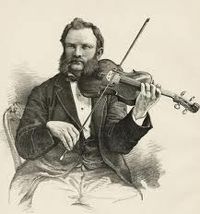Annotation:John McNeill's Highland Fling: Difference between revisions
No edit summary |
No edit summary |
||
| (6 intermediate revisions by 3 users not shown) | |||
| Line 1: | Line 1: | ||
---------- | |||
---- | {{TuneAnnotation | ||
|f_tune_annotation_title= https://tunearch.org/wiki/Annotation:John_McNeill's_Highland_Fling > | |||
'''JOHN McNEILL'S HIGHLAND FLING'''. Scottish, Pipe Strathspey. A Mixolydian. Standard tuning (fiddle). AAB. Composed by J. Scott Skinner (1842-1927), probably honoring a champion highland dancer and piper of the Victorian era, John McNeil (or McNeill). Skinner, in addition to being a renowned fiddler and composer, was a dancing master as well in his youth, working first in the Strathdon area as a dancing teacher. In 1862 at a Highland Gathering at Bray near Dublin he won several prizes for dancing, including first prize for Sword Dancing where he beat the famous dancer, John McNeill of Edinburgh, whom he much admired. Skinner, then aged 19, did this while playing the fiddle and dancing at the same time. In his autobiography My Life and Adventures, Skinner relates that he "honestly believed (the prize) should have gone to McNeill," and says that in token of this sentiment he offered the dancer the cash prize of three guineas. McNeill replied, Skinner says, "Ye're the best man that I've seen come out of the North," after which they shared a dram together. Donald R Mackenzie, Professor of Dancing, Stirling, Scotland wrote in 1910 that some of the best "Highland step-dancers" of his time were John MacNeil, and William MacLennan ( the world famous piper and dancer): "The characteristic dancing styles of these two men were truly Highland, artistic and without any affectation." | |f_annotation='''JOHN McNEILL'S HIGHLAND FLING'''. Scottish, Pipe Strathspey. A Mixolydian. Standard tuning (fiddle). AAB. Composed by J. Scott Skinner (1842-1927), probably honoring a champion highland dancer and piper of the Victorian era, John McNeil (or McNeill). Skinner, in addition to being a renowned fiddler and composer, was a dancing master as well in his youth, working first in the Strathdon area as a dancing teacher. In 1862 at a Highland Gathering at Bray near Dublin he won several prizes for dancing, including first prize for Sword Dancing where he beat the famous dancer, John McNeill of Edinburgh, whom he much admired. Skinner, then aged 19, did this while playing the fiddle and dancing at the same time. In his autobiography '''My Life and Adventures''', Skinner relates that he "honestly believed (the prize) should have gone to McNeill," and says that in token of this sentiment he offered the dancer the cash prize of three guineas. McNeill replied, Skinner says, "Ye're the best man that I've seen come out of the North," after which they shared a dram together. Donald R Mackenzie, Professor of Dancing, Stirling, Scotland wrote in 1910 that some of the best "Highland step-dancers" of his time were John MacNeil, and William MacLennan ( the world famous piper and dancer): "The characteristic dancing styles of these two men were truly Highland, artistic and without any affectation." | ||
[[File:skinner.jpg|200px|thumb|left|J. Scott Skinner]] | [[File:skinner.jpg|200px|thumb|left|J. Scott Skinner]] | ||
<br> | <br> | ||
<br> | <br> | ||
See Skinner's handwritten manuscript copy [http://www.abdn.ac.uk/scottskinner/display.php?ID=JSS0075], where, pasted over the bottom of the page is Skinner's note: *The phrase, 'Where labour is apparent, grace is wanting' does not apply to such artists," referring to McNeil, whom he thought highly | See Skinner's handwritten manuscript copy [http://www.abdn.ac.uk/scottskinner/display.php?ID=JSS0075], where, pasted over the bottom of the page is Skinner's note: *The phrase, 'Where labour is apparent, grace is wanting' does not apply to such artists," referring to McNeil, of whom he thought highly. | ||
|f_source_for_notated_version= | |||
|f_printed_sources=Skinner ('''Harp and Claymore'''), 1904; p. 48. | |||
|f_recorded_sources= | |||
|f_see_also_listing= | |||
}} | |||
Latest revision as of 04:21, 19 July 2024
X:1 T:John McNeill's Highland Fling C:James Scott Skinner B:Harp & Claymore (1904, p. 48) R:Pipe Strathspey Z:AK/Fiddler's Companion M:4/4 L:1/8 K:Amix a|e>A A/<A/A a>Ac<a|c/d/e g>d B>GG>f|e>A A/<A/A a>A c<a| c/d/e a>e c>AA:||e|a/g/f e>A a>A c<a|g/f/e d>G g>g B<g| a/g/f e>A a>Ae>d | c/d/e a>e c>A A>e|(3agf (3edc (3agf (3edc | (3gfe (3dcB (3gfe d>f | e>A A/<A/A e>A c<a|g/f/e a>e cAA |]
JOHN McNEILL'S HIGHLAND FLING. Scottish, Pipe Strathspey. A Mixolydian. Standard tuning (fiddle). AAB. Composed by J. Scott Skinner (1842-1927), probably honoring a champion highland dancer and piper of the Victorian era, John McNeil (or McNeill). Skinner, in addition to being a renowned fiddler and composer, was a dancing master as well in his youth, working first in the Strathdon area as a dancing teacher. In 1862 at a Highland Gathering at Bray near Dublin he won several prizes for dancing, including first prize for Sword Dancing where he beat the famous dancer, John McNeill of Edinburgh, whom he much admired. Skinner, then aged 19, did this while playing the fiddle and dancing at the same time. In his autobiography My Life and Adventures, Skinner relates that he "honestly believed (the prize) should have gone to McNeill," and says that in token of this sentiment he offered the dancer the cash prize of three guineas. McNeill replied, Skinner says, "Ye're the best man that I've seen come out of the North," after which they shared a dram together. Donald R Mackenzie, Professor of Dancing, Stirling, Scotland wrote in 1910 that some of the best "Highland step-dancers" of his time were John MacNeil, and William MacLennan ( the world famous piper and dancer): "The characteristic dancing styles of these two men were truly Highland, artistic and without any affectation."

See Skinner's handwritten manuscript copy [1], where, pasted over the bottom of the page is Skinner's note: *The phrase, 'Where labour is apparent, grace is wanting' does not apply to such artists," referring to McNeil, of whom he thought highly.

